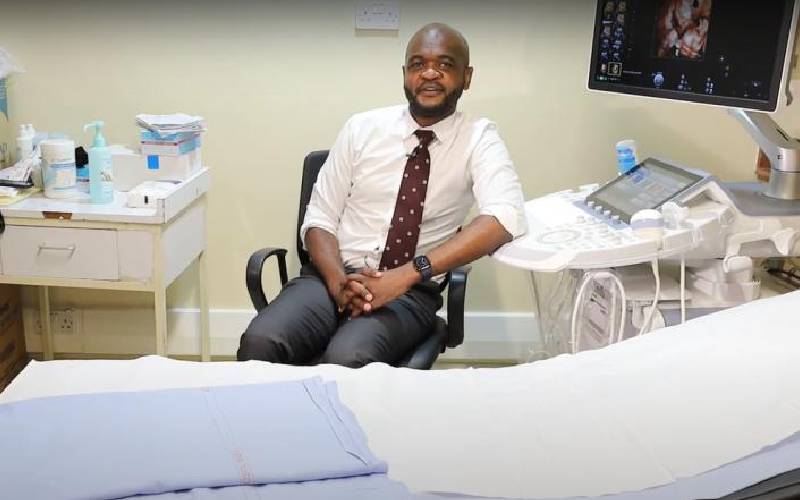
Foetal medicine specialist Dr Sikolia Wanyonyi. [File, Standard]
The patients who come to see Dr Sikolia Wanyonyi don’t know who they are, can’t speak, hear and have to be carried for nine months while the checkups last.
Dr Sikolia is also the only expert for the said patients in Kenya as the country’s sole foetal medicine specialist.
“The foetus is our key patient,” says Dr Sikolia who provides care for unborn babies by diagnosing any condition that can compromise their health and that of the mother’s life and intervening before delivery.
It takes about 13 years of training and specialisation to become a certified foetal medicine specialist. Besides a basic medical degree, one has to specialise in obstetrics and gynaecology before further training to understand the high-risk pregnancies and different foetal conditions.
In his case, Dr Sikolia, now based at Aga Khan University Hospital in Nairobi, studied in the UK for a fellowship before proceeding to the University of Barcelona for his Masters in foetal medicine.
“It was all by chance because I was interested in obstetrics and gynaecology I did not know much beyond that until I interacted with colleagues who had come over to do some research and realised we could actually do more than just deliveries.”
He was later captivated in ultrasound, “particularly the degree of detail that can be discerned and it is just exciting, seeing the baby in there (the womb) is actually extremely remarkable… a life within someone else.”
In most circumstances, an anomaly scan is often used to examine the foetus in totality to detect any abnormalities on the organs or other body parts.
This scan, according to Dr Sikolia, should be done by every pregnant woman at 20 weeks to assess the baby’s physical health.
“We use 3D technology to look at different sections of the brain and take measurements, like the size of the head,” he explained adding that some structures continue to develop as the foetus develops, but early interventions help specialists to detect any deviation from the norm.
In case an anomaly is diagnosed in a foetus, Dr Sikolia takes two approaches: first is to determine if the condition is compatible with life, that is, whether the baby will survive after birth, and if so, what type of interventions should be done in the womb or soon after birth.
“If we choose to intervene within the womb, intervention should be such that it will help improve the health of the baby and prolong the pregnancy until birth,” he says. “But if this cannot be achieved, we wait for the baby to be born.”
Intervention in some situations may not be necessary inside the womb, but if nothing is done immediately after birth, the baby can die.
“The baby could have a severe heart disease while in the womb and for which little can be done, but when born an intervention can be instituted immediately and the baby will survive,” explains Dr Sikolia, emphasising that failure for early diagnosis could lead to delays in intervention and even death.
In case the condition of the foetus is incompatible with life, the mother is offered the choice of continuing with the pregnancy or terminating it legally. If a mother chooses to continue with pregnancy, she is advised on the outcomes.
Experts in foetal medicine also check the placenta – the main organ feeding the baby – and whether it has enough blood flow, the baby’s lifeline.
For Dr Sikolia, being the only specialist in foetal medicine in the country puts him at the front seat of encountering the best and the worst of obstetrics and no day is the same or predictable.
“It is not always good news here because there are many moments that we break down and cry.”
Dr Sikolia says he also faces conditions which are beyond him and all he can give a mother is hope.
“You may have to tell a mother that the baby has low survival chances and those are usually very low moments,” he says, attributing most unfortunate cases to lack of screening in the first trimester among most women who end up advancing into pregnancy without knowing the condition of the baby they are carrying.
Sonographers and radiologists and everyone involved in imaging of expectant mothers, Dr Sikolia reckons, should be keen while doing basic scans to identify at risk pregnancies for referral to obstetricians for timely intervention.
“There are so many conditions we can diagnose, some could be structural problems that affect the formation of the baby,” says Dr Sikolia .
He says his source of inspiration is seeing a woman who has suffered multiple miscarriages finally conceive and give birth to a healthy baby after treatment.
“I had a patient who had had 13 miscarriages!” recalls Dr Sikolia. “This woman had completely given up ever having a child. But through our interventions and collaboration with the patient, we were able to get the mother to carry a pregnancy to term and take a baby home.”
Dr Sikolia’s vision is for more Kenyans to specialise in foetal medicine so as “to work together not within institutions but across board.”
 The Standard Group Plc is a multi-media organization with investments in media
platforms spanning newspaper print
operations, television, radio broadcasting, digital and online services. The
Standard Group is recognized as a
leading multi-media house in Kenya with a key influence in matters of national
and international interest.
The Standard Group Plc is a multi-media organization with investments in media
platforms spanning newspaper print
operations, television, radio broadcasting, digital and online services. The
Standard Group is recognized as a
leading multi-media house in Kenya with a key influence in matters of national
and international interest.











